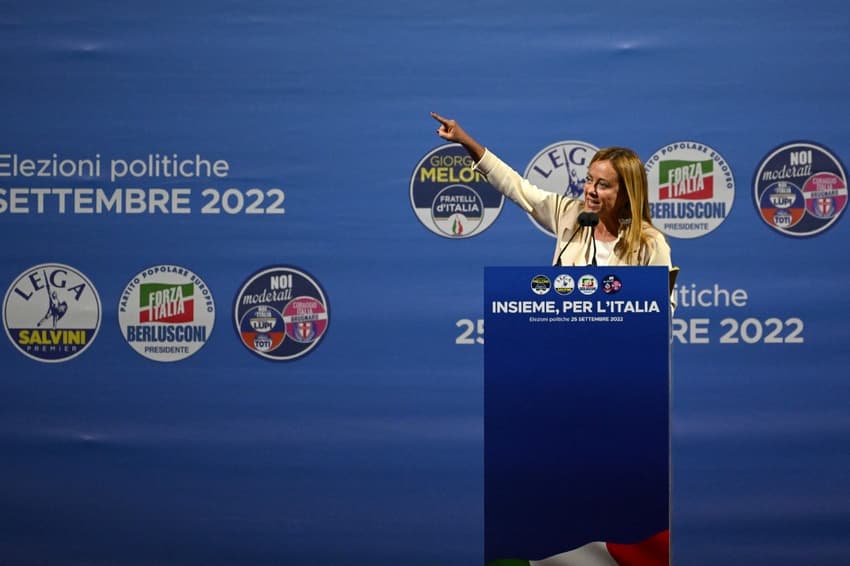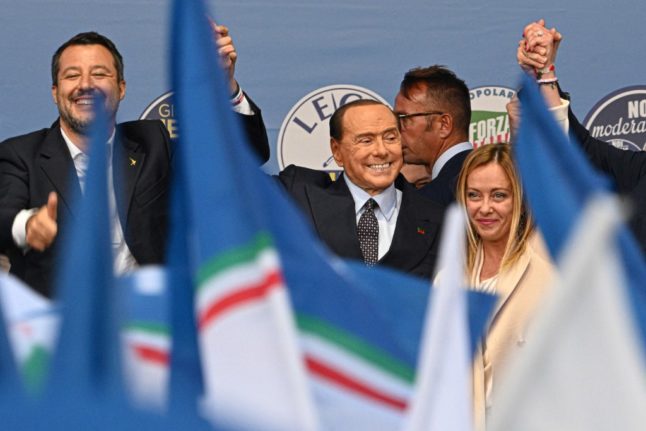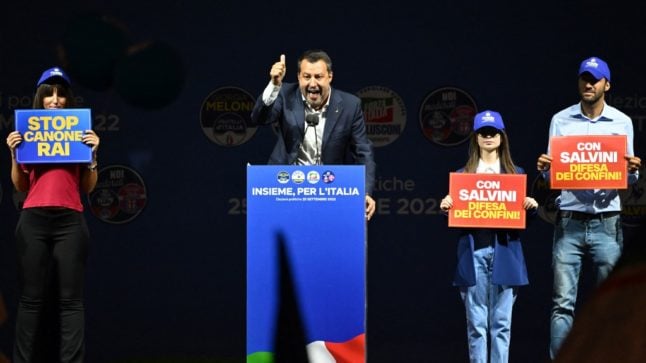Financial markets wary of far-right election win in Italy

Giorgia Meloni’s plans to increase public spending and further deepen Italy's debt are causing concern in financial markets and in Brussels.
From her euroscepticism to her impact on Italy's enormous debt, the likely victory of far-right leader Giorgia Meloni in elections Sunday is unsettling international rating agencies.
The Brothers of Italy leader has abandoned her calls for the country to leave the EU's single currency and the joint programme with her right-wing allies – the anti-immigration League and Silvio Berlusconi's Forza Italia – commits them to the European project.
READ ALSO: Is Brothers of Italy a ‘far right’ party?
But concerns persist, particularly after she reiterated her support this week for Hungarian Prime Minister Viktor Orban in his battles with Brussels.
At an election rally in mid-September in Milan, Meloni declared that "the good times are over" and that Italy, like others, "is going to start defending its own national interests" in the EU.

Meloni’s right-wing coalition includes Matteo Salvini’s anti-immigrant League and Forza Italia, led by former premier Silvio Berlusconi. Photo by Andreas SOLARO / AFP
"I don't know any nationalists who are not against European institutions," Frans Timmermans, vice-president of the European Commission, noted in an interview with La Repubblica newspaper earlier this month.
EU recovery plan
Well placed to become the next prime minister, Meloni wants a "confederate Europe" which "respects the sovereignty of member states" to manage their own affairs.
READ ALSO: Italy’s right confident of election win at last rallies before vote
She has called for a renegotiation of the Italian part of the EU's mammoth post-pandemic recovery plan, from which Italy stands to receive almost 200 billion euros, to account for the spike in energy prices linked to the Ukraine war.
But the money is dependent on a series of reforms, which outgoing Prime Minister Mario Draghi began but must still be implemented.
"We could end up with a serious clash of ideas between Italy, which is by far the biggest beneficiary of the recovery plan, and the EU," noted Nicola Nobile of Oxford Economics, a consultancy.
"There are many risks, but it will all depend on which Meloni leads the government – the one who has attacked Europe in the past or the one who now advocates a more moderate approach and could pursue the status quo on fiscal matters," she told AFP.
Spiralling debt
Concerns about a slip in the reform timetable and an increase in Italy's debt after the elections have already caused rating agencies Standard & Poor's and Moody's to downgrade the outlook for the country's credit rating.

Matteo Salvini, leader of the League, is one of the staunchest supporters of the so-called ‘flat tax’, which could cost Italy between 20 and 58 billion euros. Photo by Andreas SOLARO / AFP
Italy is saddled with a debt of more than 2.7 trillion euros, or some 150 percent of gross domestic product (GDP), the highest ratio in the eurozone after Greece.
Meloni's right-wing coalition is calling for a revision of the EU's rules against overspending, which were suspended during the pandemic but set a ceiling of three percent of GDP for the deficit and 60 percent for debt.
READ ALSO: Salvini vs Meloni: Can Italy’s far-right rivals put differences aside?
While some flexibility might be allowed, "it would be political suicide to say, 'we don't care about all the rules'," noted Peter Bofinger, professor of economy at the University of Wuerzburg.
"If Italy deviates from the European consensus" and does not maintain a minimum of budgetary discipline, "not even the European Central Bank will be able to help it", he told AFP.
Costly election promises
The right-wing coalition has promised to cut taxes while increasing spending, including raising the minimum pension – plans that risk being hugely expensive.
"Their programme is very vague and does not explain how to finance these measures," said Nobile.
"If they were implemented, Italy's public deficit would remain above six percent of GDP for five years from 2023," pushing the already high public debt to "unsustainable levels".
READ ALSO: Giorgia Meloni’s party will likely win the elections – but will it last?
The coalition's flagship measure, a so-called flat tax that the League wants to set at 15 percent and Berlusconi at 23 percent, could cost between 20 billion and 58 billion euros, according to Italy's public accounts observatory.
Investors fear the government could end up like its predecessors – Berlusconi resigned in 2011, under pressure from the markets and a surge in the cost of debt.
Comments
See Also
From her euroscepticism to her impact on Italy's enormous debt, the likely victory of far-right leader Giorgia Meloni in elections Sunday is unsettling international rating agencies.
The Brothers of Italy leader has abandoned her calls for the country to leave the EU's single currency and the joint programme with her right-wing allies – the anti-immigration League and Silvio Berlusconi's Forza Italia – commits them to the European project.
READ ALSO: Is Brothers of Italy a ‘far right’ party?
But concerns persist, particularly after she reiterated her support this week for Hungarian Prime Minister Viktor Orban in his battles with Brussels.
At an election rally in mid-September in Milan, Meloni declared that "the good times are over" and that Italy, like others, "is going to start defending its own national interests" in the EU.

"I don't know any nationalists who are not against European institutions," Frans Timmermans, vice-president of the European Commission, noted in an interview with La Repubblica newspaper earlier this month.
EU recovery plan
Well placed to become the next prime minister, Meloni wants a "confederate Europe" which "respects the sovereignty of member states" to manage their own affairs.
READ ALSO: Italy’s right confident of election win at last rallies before vote
She has called for a renegotiation of the Italian part of the EU's mammoth post-pandemic recovery plan, from which Italy stands to receive almost 200 billion euros, to account for the spike in energy prices linked to the Ukraine war.
But the money is dependent on a series of reforms, which outgoing Prime Minister Mario Draghi began but must still be implemented.
"We could end up with a serious clash of ideas between Italy, which is by far the biggest beneficiary of the recovery plan, and the EU," noted Nicola Nobile of Oxford Economics, a consultancy.
"There are many risks, but it will all depend on which Meloni leads the government – the one who has attacked Europe in the past or the one who now advocates a more moderate approach and could pursue the status quo on fiscal matters," she told AFP.
Spiralling debt
Concerns about a slip in the reform timetable and an increase in Italy's debt after the elections have already caused rating agencies Standard & Poor's and Moody's to downgrade the outlook for the country's credit rating.

Italy is saddled with a debt of more than 2.7 trillion euros, or some 150 percent of gross domestic product (GDP), the highest ratio in the eurozone after Greece.
Meloni's right-wing coalition is calling for a revision of the EU's rules against overspending, which were suspended during the pandemic but set a ceiling of three percent of GDP for the deficit and 60 percent for debt.
READ ALSO: Salvini vs Meloni: Can Italy’s far-right rivals put differences aside?
While some flexibility might be allowed, "it would be political suicide to say, 'we don't care about all the rules'," noted Peter Bofinger, professor of economy at the University of Wuerzburg.
"If Italy deviates from the European consensus" and does not maintain a minimum of budgetary discipline, "not even the European Central Bank will be able to help it", he told AFP.
Costly election promises
The right-wing coalition has promised to cut taxes while increasing spending, including raising the minimum pension – plans that risk being hugely expensive.
"Their programme is very vague and does not explain how to finance these measures," said Nobile.
"If they were implemented, Italy's public deficit would remain above six percent of GDP for five years from 2023," pushing the already high public debt to "unsustainable levels".
READ ALSO: Giorgia Meloni’s party will likely win the elections – but will it last?
The coalition's flagship measure, a so-called flat tax that the League wants to set at 15 percent and Berlusconi at 23 percent, could cost between 20 billion and 58 billion euros, according to Italy's public accounts observatory.
Investors fear the government could end up like its predecessors – Berlusconi resigned in 2011, under pressure from the markets and a surge in the cost of debt.
Join the conversation in our comments section below. Share your own views and experience and if you have a question or suggestion for our journalists then email us at [email protected].
Please keep comments civil, constructive and on topic – and make sure to read our terms of use before getting involved.
Please log in here to leave a comment.